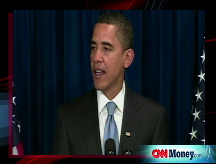Dollar falls against rivals
Greenback weakens against euro and pound as investors anticipate more federal aid for ailing banks.
NEW YORK (CNNMoney.com) -- The U.S. dollar fell against major currencies Wednesday, reversing a trend from earlier in the session, as rising stock prices appeared to increase investors' appetite for more risky assets.
The euro was up 0.5% to $1.2974 from $1.2904 late Tuesday. The 15-nation currency had retreated to $1.2824 earlier in the session.
The pound bounced off of a 7-1/2-year low against the dollar to trade at $1.3948, up 0.2% from $1.3927.
Against the yen, the greenback slipped to ¥89.27 from ¥89.76. It reached a session high of ¥90.16.
The dollar started to weaken against rival currencies Wednesday as a rally in the stock market gained momentum.
The greenback, which is considered a safe haven, often climbs when stock prices decline as investors flee risky assets of all sorts. When stock prices climb, however, the dollar often loses ground as investors seek higher returns in other, more risky markets.
Stocks rose in afternoon trade, led by shares of financial services companies, as investors bet that the government will provide additional federal bailout money for battered banks. An upbeat quarterly report from blue-chip firm IBM also stoked the rally.
"Worries about euro stability and the U.K. banking sector helped support the dollar," said Sacha Tihanyi, currency strategist at Scotia Capital in Toronto. But those concerns "may be settling down a bit, in light of the potential uses of second tranch of TARP funds," he added.
Last week, President Barack Obama secured access to the second half of the $700 billion Troubled Asset Relief Program, or TARP, which is meant to help aid ailing banks.
Still the positive sentiment came against a back drop of ongoing concerns about the health of the global banking system.
The pound has gotten battered this week, sinking on a new bank rescue plan announced Monday. The bailout is aimed at protecting banks against further losses and guaranteeing bank assets backed by mortgages and other loans.
Huge losses from Royal Bank of Scotland (RBS) also have investors worrying about the health of the banking sector and the possibility of further government intervention.
Adding to traders' worries was a speech by Bank of England Gov. Mervyn King on Tuesday, in which he said the British economy may retract in the first half of 2009. King also said monetary policy alone - raising and lowering interest rates - will not be sufficient to boost the economy.
At the same time, traders are concerned about the European economy after the European Commission said the euro-zone economy will likely shrink 1.9% this year, and Standard & Poor's downgraded Spain's AAA credit rating.
"This is nothing more than a temporary breather, after the dollar moved a lot over the past 48 hours," said Neil Mellor, currency strategist at Bank of New York Mellon in London. "You inevitably get a time in any rise when there is a degree of stability."
Mellor said despite the slight course correction, the dollar remains well-supported, as traders continue to react to the same negative news that has been ongoing for the past few days.
"There is a temptation to read into stability, but I don't believe that's appropriate at this time," Mellor added. "As things stand, given the prevalent gloom, the dollar may even turn around later in the day."
The dollar has generally been in an upward trend against European currencies for the past several months, especially as the economic situation in Europe has taken a downward turn. Furthermore, for many, the dollar still holds the "world's currency" title, and risk-averse traders invest in the dollar in times of trouble.
"Traders believe the U.S. is likely to see the light at the end of the tunnel before the U.K. and certainly before the euro zone," Mellor said. "This is risk aversion and flight to quality, no question about it."
In the current trading pattern, the dollar has fallen against the yen when it is up against the euro - and the dollar has risen against the yen when it is down against the euro. Traders tend to borrow the yen to fund investments in higher-yielding currencies, but when those currencies weaken, and investors reverse their positions, they are forced to buy back the yen, raising its value.
Part of the Obama stimulus package is a tax credit of $500 for individuals and $1,000 for couples (with some income restrictions). Tell realstories@cnnmoney.com what you will do with the money if Congress passes the measure. Your responses could be part of an upcoming story. ![]()



